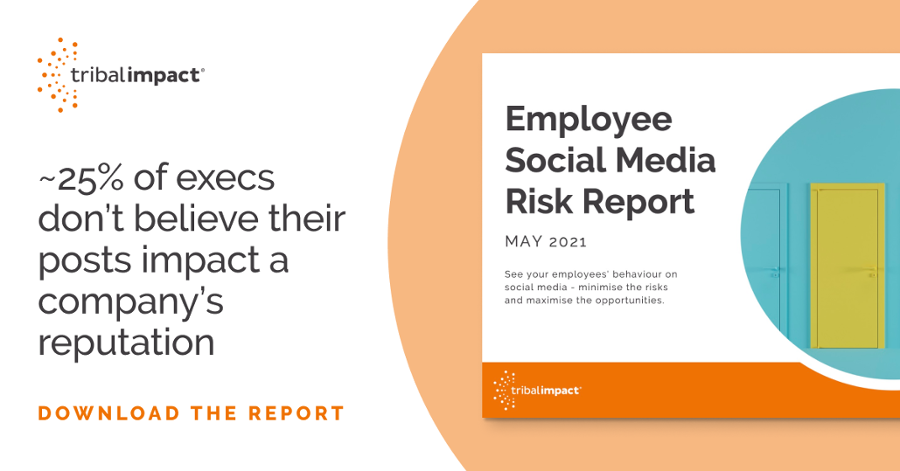
From our recent survey facts on employees’ behaviours and beliefs on social media in the workplace to the pressing legal issues of when employees rights trump business interests... Here's a round-up of the stand-out issues from our recent social media policy webinar: Is your social media policy protecting your brand reputation?
Last week, our tribe’s Chief, Sarah Goodall, hosted a webinar with Joseph Lappin, Partner and Head of Employment at Stewarts Law. It was packed with useful information covering practical and legal issues so we thought we’d share the insights with you - for those who prefer to read rather than watch!
- Do employees really understand your social media policy?
- Which employees are the highest risk groups when it comes to social media conduct?
- When do an employee’s rights to freedom of expression on social media trump business interests?
- When is sacking an employee for social media misconduct justified?
- Should or could you monitor social media accounts?
- Top tips for social media policies
- And more...
Workplace Social Media Behaviours And Attitudes: Our Recent Findings
Sarah began the webinar with her thoughts on the recent survey results of our recent Employee Social Media Risk Report 2021.
The findings showed some worrying risks but also opportunities:
- Over 80% of the people that answered the survey are on social media, pretty much every day.
- 40% of those in that sort of age bracket of 18 to 34 have either have read and not understood, never read or aren't even aware of the social media policy. That's nearly half of that age group that we assumed to be digital natives and savvy on social media.
- The same age group is also the one that is twice as likely to post a negative review about an employer.
Balancing Employee's Rights - Where Do The Lines Blur?
One of the biggest issues facing employers is that employees will often claim that they have a right to privacy and freedom of expression (which are protected by Article 8 and Article 10 of the European Convention on Human Rights).
Although most of us are aware of these rights, Joseph explained that’ what’s less well known is that they’re not absolute rights. Interference is okay if it’s necessary to protect the rights and freedoms of others.
So where are the lines drawn? As will all issues, they’re blurry and depend on the facts but Joseph gave a couple of examples and guiding principles employers should be aware of.

The Right To Privacy
Whether an employee can rely on this right depends on whether they have a reasonable expectation of privacy.
How public is the post?
Joseph pointed out what appears to be a common-sense approach: an employee would have a hard time trying to rely on this right for a Tweet that the entire world can see! In fact, many claims fail because of the public nature of social media. However, sometimes employees have been successful at a tribunal in cases where they’ve shared on Facebook because it’s possible to restrict privacy settings to certain friends/groups.
Even then, it can still be a tough hurdle to overcome because family and friends can still reshare posts. (I imagine we’ve all seen viral posts that had innocent beginnings for friends’ eyes only!)
Is the action taken by an employer proportionate?
If an employee can argue that their post was private, employers may still justify interfering with that right by taking steps such as disciplinary action. It all depends on whether their actions are proportionate to the offence. (We cover this further down.)
Freedom Of Expression
With the political and social justice unrest of the past 12-18 months, freedom of expression is an issue that we know has been troubling employers even more.
So where does the balance lie?
In the webinar, Joseph took us through the interesting European Court of Human Rights case of Herbei vs Hungary.
The case involved HR professionals at a large Hungarian bank that had set up a website for fellow professionals. He was identifiable by his photo and he stated he worked for a large Hungarian bank. His general criticism of the way employers dealt with those in HR led to his employer sacking him.
The case went all the way to the European Court of Human Rights, who decided that he had been unfairly dismissed and that their actions infringed on his right to freedom of expression. They pointed out that:
- His motive was simply to share knowledge, instead of being to air a real grievance
- The bank could not show an adverse effect their business interests
- A lesser sanction would have been more appropriate.
As Joseph pointed out if he had named the bank or inadvertently disclosed confidential information the case may have been decided differently. Once again, it all comes down to the facts!
When Is Sacking An Employee Justified?
There have been many high-profile cases recently where employers have sacked an individual for their conduct on social media. In some instances, it seems justified but in others, it can backfire - as can be seen in our blog, 7 Employees That Got It Wrong on Social Media. Or Did Their Employer?
Social media conduct issues always seem like a tricky area to navigate but, as Joseph said in the webinar, the courts have pointed out that there are no special social media unfair dismissal rules. The same legal issues apply but in a different setting.
However, there is a case that highlighted specific issues to consider with social media policies - Game Retail Ltd v Laws.
- Is there a clear social media policy in place? If there is and it's clear in outlining what constitutes gross misconduct; then employers are less likely to be on the hook for unfair dismissal if they follows its own policy.
- How serious is the alleged misconduct?
- Has there been similar misconduct in the past?
- What damage has been done to their reputation? Is dismissal the right sanction or could they use a lesser one?
What About Monitoring?
This is an area that many employers want to know. Joseph pointed out that it’s a tricky area with issues such as data protection and privacy coming into play. His advice:
Don’t monitor unless it’s really necessary. And legal issues aside, remember what effect it may have on your employees. If you do need to monitor (e.g. as required in certain industries), then you should always state so from the outset.
Strict Liability For Anti-Equality Acts “In The Course Of Employment”
Joseph explained, with acts of discrimination or harassment that concern protected characteristics under The Equality Act 2010, it doesn’t matter whether the employer did anything to prevent such actions from happening. The key issue is whether their actions are in the course of their employment. If so, they are strictly liable for their employees’ actions - and this applies to social media too.
It’s a policy that encourages employers to maintain standards of good practice by their employees and staff.
Joseph discussed two high-profile cases in the webinar that showed how courts may decide what is “in the course of employment”. (You can watch the webinar replay here.)
So where does that leave social media policies? Do they offer any protection if there is a clear “Do Not” harass or post discriminatory comments on social media?
Joseph explained that a clear social media policy will certainly go in an employer's favour but, as you may have guessed, it’s just one factor and it depends on the facts!
Top Tips For Social Media Policies
Sarah ended by sharing some top tips for drafting social media policies.
- Make your policy accessible and easy to find
- Make it easy to consume.
- Talk about the opportunity as well as the risk. It’s too easy to scare people off. Remember there’s a huge opportunity for employees as well as for the business!
- Use quizzes. It’s the best way to check understanding. It’s something we do with our Social Media Policy eLearning – using scenario-based questions to check how an employee would act in a certain situation.
- Keep it fun!
- Social media policies should be non-contractual
One great piece of advice Joseph also gave us:
- Keep social media policies non-contractual. It may be counterintuitive, but if they are contractual, then employees must agree to the changes. If the social media policy is a separate document, you can update and review them regularly without having to consult employees.
Although social media policies can be a tricky area to navigate, as Joseph reiterated in the webinar, the legal issues to consider are really no different from what employers have had to navigate in different scenarios for years. With a common sense approach, a carefully drafted policy and training you can avoid many of the pitfalls.
Some Further Helpful Resources
- Watch the webinar replay here: Is Your Social Media Policy Protecting Your Brand Reputation?
- 2021 Employee Social Media Risk Report
- Create a Social Media Policy [Free Template]
- Social Media Policy eBook: The How-To Guide For Managing Employee Risk And Brand Reputation
- Blog: Why Social Media Policies Alone Aren’t Enough (And What Our eLearning Involves)

